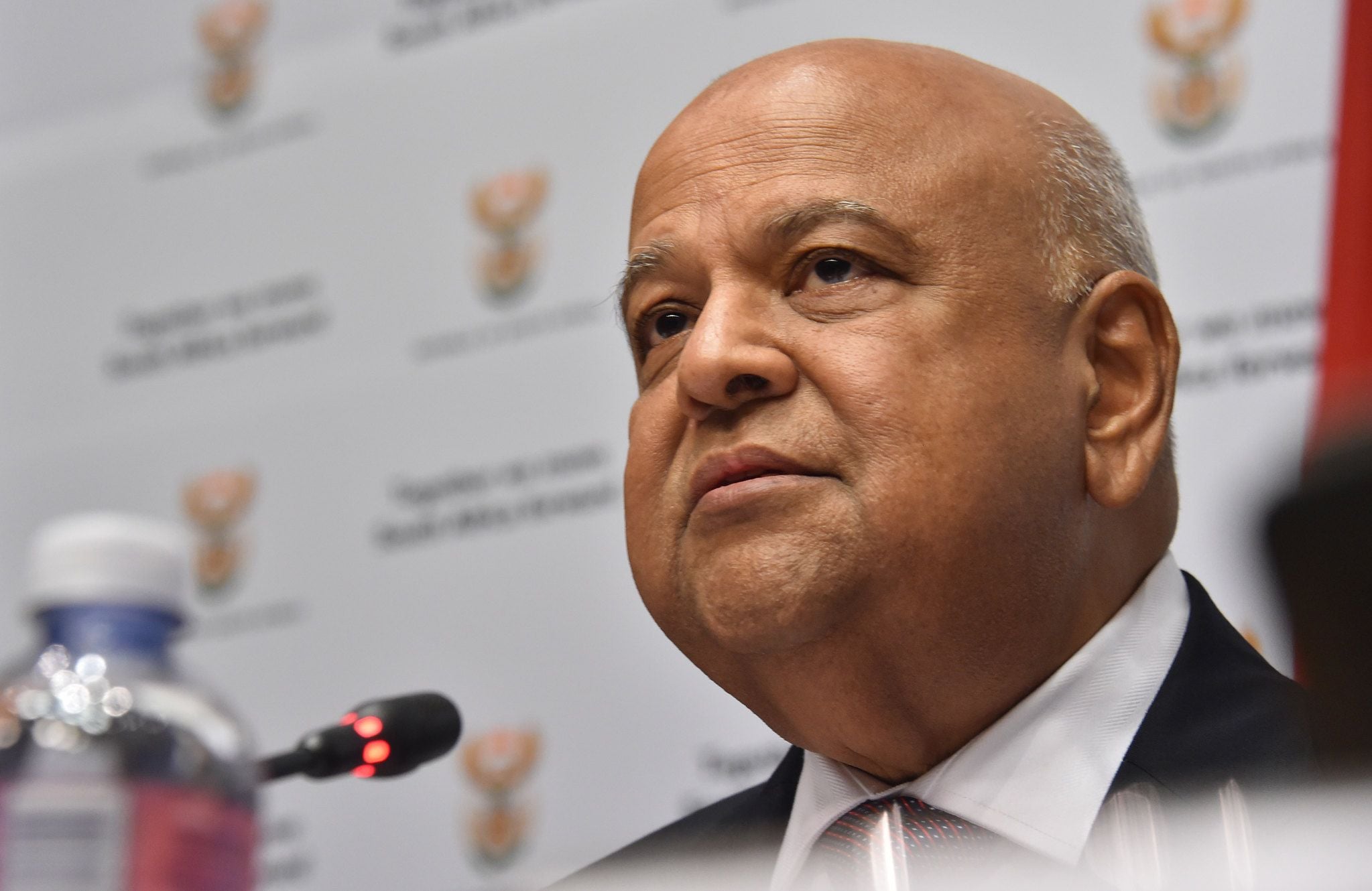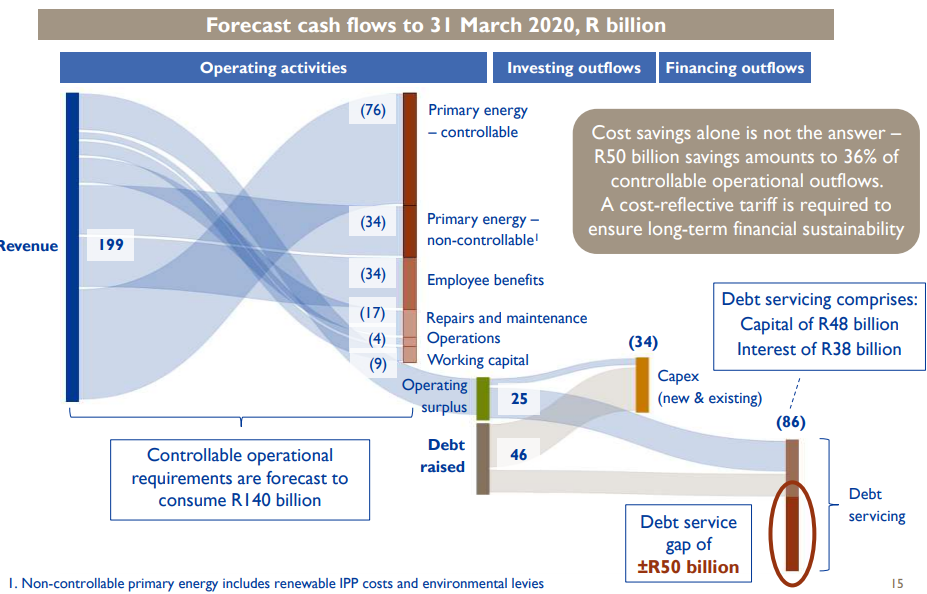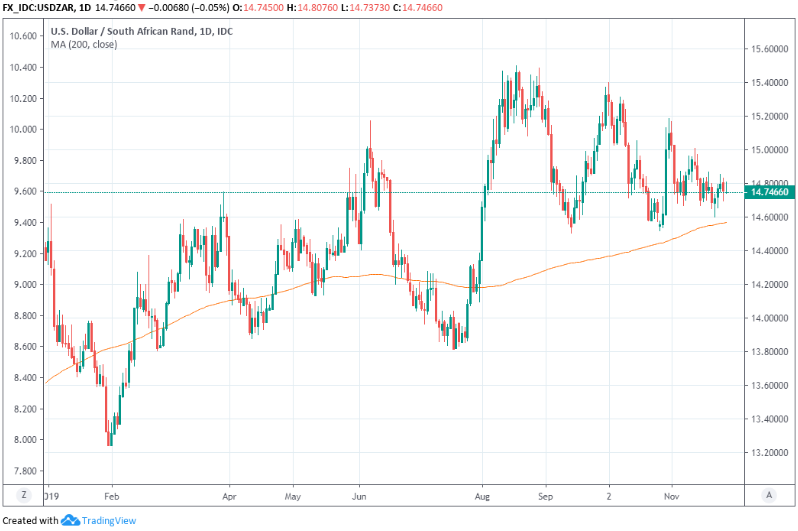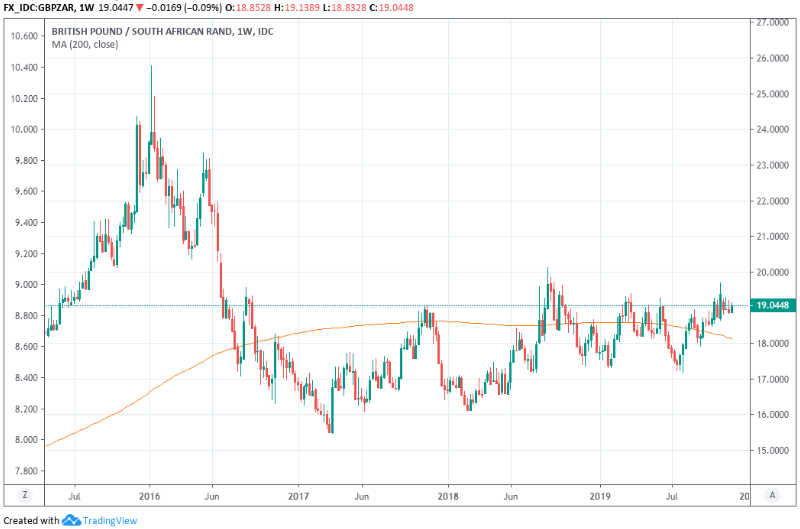South African Rand Wobbles on Eskom Financial Results as Analysts Tip Losses Ahead
- Written by: James Skinner

Image © GovernmentZA. Minister for Public Enterprises Pravin Gordhan.
- ZAR wobbles in risk-on market after Eskom unveils financial results.
- Eskom still reliant on Gov as it has just 64% of required 2020 income.
- Comes after S&P downgrades outlook on 'junk' rating to negative.
- As market and Moody's wait on Eskom as well as budget reform plan.
- Standard Bank and ING tip ZAR depreciation into year-end, in 2020.
- USD/ZAR rate eyeing 15.0 as GBP/ZAR targets post-referendum high.
The Rand wobbled Thursday after the ailing electricity mononoly Eskom said it will remain reliant on government financial support next year because it has barely more than half of the funding it requires for 2020, reminding investors of the ever-present threat to South Africa's 'investment grade' credit rating.
Eskom said Thursday that cash flow remains "severely constrained" despite a positive performance for the first half of the financial year and that its "cyclical" business will make a loss by year-end. The company says it will remain reliant on government "to support Eskom’s status as a going concern" and that it has secured only 64% of the funding it requires to operate throughout next year even after taking into account an R56 bn bailout from the taxpayer.
Revenues rose more than 10% to R107.5 bn in the year to the end of September but on lower sales volumes, which were down 1.29%. And although the company reported a marginally lower debt-to-EBITDA ratio, that particular measure of indebtedness still came in at a stonking 16.5 times cash earnings. Meanwhile, other measures of indebtedness showed the balance sheet deteriorating, with the debt-to-equity ratio rising from 2.51 to 2.82 and the gearing ratio climbing from 72% to 74%.
Above: Cash flow situation summary taken from Eskom Holdings first-half financial results.
The company said its cost base "simply cannot accommodate sufficient efficiencies to bridge the revenue gap" and that it will need permission from the government to raise electricity tariffs in a manner that actually reflects the costs of running of the company. It gave no new information about how or when it will split itself up into three separate operating divisions as part of the government's turnaround plan, one of which it is hoped will attract private sector investment.
"We nevertheless see the rand as already discounting the various economic weaknesses cited by both the rating agencies and IMF (the poor fiscus, the inefficient SOEs, the ever-present threat of power cuts, high unemployment, and lack of real progress with policy reform). The rand is currently at R14.76/$, and we forecast it at R14.85/$ by year-end and R14.80/$ by end-2020 — because we expect restorative policy action next year as well as a somewhat firmer global economy," says Shireen Darmalingham at Standard Bank.
South Africa's Rand ceded ground to the Dollar and Pound in the wake of the announcement as investors likely saw it having negative implications for the country's last remaining investment grade credit rating. Eskom Holdings' SOC 7.125% 2025 bond was quoted 0.06% lower by Saxo Bank in the wake of the update while short and long-term South African government bond yields rose.
The government ultimately underwrites all of Eskom's debt because the company is publicly owned but the Treasury has given explicit guarantees to lenders in relation to R350bn of it, which is why Moody's has made fixing the insolvent and operationally broken company a priority task for the government in its efforts to preserve South Africa's top credit rating.
Above: USD/ZAR rate shown at daily intervals.
The Moody's 'investment grade' rating is the only thing standing between the Rand and potentially-large outflows of capital from South Africa. However, the agency cut its outlook on the rating to negative back in October and could now downgrade South Africa to 'junk' as soon as February 2020.
Thursday's update might not be welcomed by rating agencies because its leaves hanging in the air an ongoing possibility of Eskom having to ask the Treasury for more financial assistance next year, which would drive an even greater deterioration in public finances that are already in a bad way. The government said in October its budget deficit will soon top the 6% of GDP threshold and that debt will rise above 70% of GDP in the coming years due to support for Eskom as well as many other factors.
"We view ZAR as the least attractive high yielder in the region. Unlike the case for Russia and Turkey, growth should continue to slow, there is a clear risk of a rating downgrade from Moody’s next year (as slowing growth is translating into non-stabilising/increasing Debt/GDP path – Figure 74) and on a valuation basis, ZAR does not screen cheap vs USD. While both risk-adjusted carry and real yield don’t look unattractive, they don’t account for the fiscal risk present in ZAR assets," says Petr Krpata, chief EMEA strategist at ING.
Eskom's result and price action in the Rand comes as markets digest the latest developments in the U.S.-China geopolitcal and trade face-off, with President Donald Trump having signed the Hong Kong Human Rights and Democracy Act into law Wednesday just as investors were celebrating mutual claims of progress in talks aimed at firming up the 'phase one deal' that was said to have been agreed on October 11.
Above: Pound-to-Rand rate shown at weekly intervals.
The decision drew immediate condemnation from Beijing as well as threats of retaliation. Speculation in Chinese media suggests that retaliation could see some U.S. lawmakers and diplomats, including Secretary of State Mike Pompeo, prevented from travelling to China.
Commerce Ministry spokesperson Gao Feng told CNBC News at a press conference on Thursday the "relevant news has been reported", in response to a question about the trade talks. It doesn't appear as if the Hong Kong spat is preventing either of the world's two largest economies from working toward a deal to end the trade war between them.
People's Daily, a part of the state-ran Xinhua News Agency, published the "guiding opinions of the Central Committee of the Communist Party of China on promoting the high quality development of trade" Thursday in which it was comfirmed that China's leaders are set to embark upon a broad program of trade and economic reforms. Included among the 'opinions' are suggestions of changes to intellectual property protections for foreign companies operating in China, a key White House demand.
Premier Li Keqiang appears to have given instructions of a similar effect to the State Council this week. Both sides said Wednesday they were making progress toward a 'phase one deal', with China's Commerce Ministry having noted they “discussed how to resolve each other’s core concerns and reached consensus on how to resolve related issues.”
Ending the trade war is important for the Rand, which is under pressure on the domestic side from a stretched public purse and weak economy, while being challenged on the global markets by the ebb and flow of appetite for riskier developing world currencies. With the U.S.-China trade conflict key to the global economic outlook, it will also be an important determinant of demand for the Rand among international investors.
"ZAR’s real yield does not compensate for the high levels of CDS (when compared to RUB and ZAR). With 2020 unlikely to be an across-the-board risk-on environment (as global growth will remain subdued and USD won’t be depreciating for idiosyncratic reasons), there won’t be much hiding for ZAR. Rather, other high yielding currencies should be preferred in our view (both within the CEEMEA region and globally)," Krpata says.
Krpata and ING forecast the Rand will cede ground to the Dollar in the weeks ahead, with the USD/ZAR rate closing both the 2019 and 2020 years at 15.0. The Pound-to-Rand rate is tipped to rise from 19.04 Thursday to 19.96 by year-end and to 20.72 before the end of 2020. The latter target would be highest level of the Pound-to-Rand rate since the weeks after the Brexit referendum of 2016.
Time to move your money? The Global Reach Best Exchange Rate Guarantee offers you competitive rates and maximises your currency transfer. Global Reach can offer great rates, tailored transfers, and market insight to help you choose the best times for you to trade. Speaking to a currency specialist helps you to capitalise on positive market shifts and make the most of your money. Find out more here.
* Advertisement








